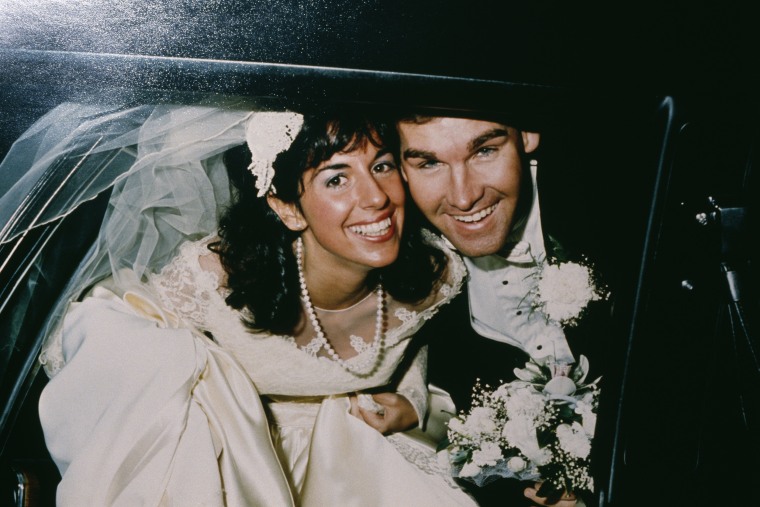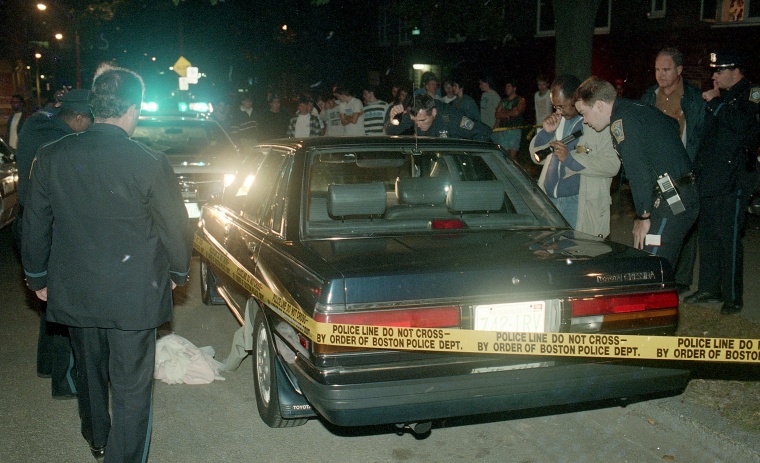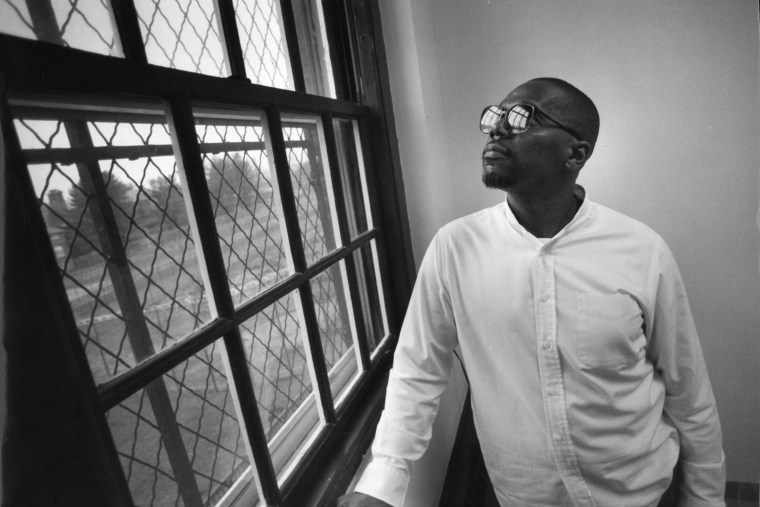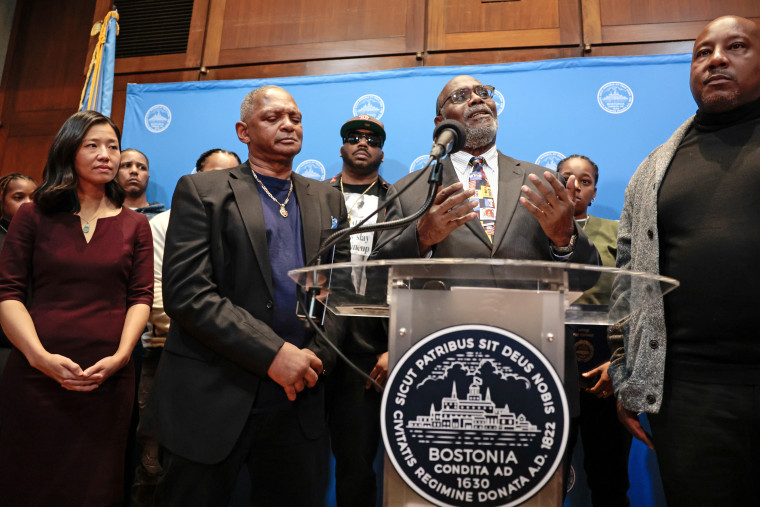Late last year, I wrote about Boston Mayor Michelle Wu's apology on behalf of the city to two Black men falsely accused of murdering a white woman named Carol Stuart in 1989.
In reality, the two men — Alan Swanson and Willie Bennett — had essentially been framed. Stuart's husband, Charles Stuart, was found to have committed the murder after he died by suicide. But not before he sent news media, police and officials as high-ranking as Boston's mayor on a wild-goose chase for the purported killer, who he claimed was a Black man.
Adrian Walker was a stellar writer for The Boston Globe at the time (still is, in fact) and was deeply skeptical of Charles Stuart's story. His reporting has provided the framework for a hit docuseries on Max and an accompanying podcast, produced in collaboration with the Globe, called "Murder in Boston: Roots, Rampage & Reckoning."
Walker and I recently sat for an interview, in which we discussed how one man's racist lie snowballed into a citywide crusade and what that frenzy says about Boston and the United States more broadly.
Watch the conversation below. And if you’d like to read it instead, a transcript of our convo, edited for length and clarity, follows:
JJ: Can you talk to me about what that transition from working in Miami to working in Boston was like? What kinds of things were you expecting going to Boston? Because the docuseries talks about the racial history, the busing and integration. What were you expecting as a journalist heading to Boston?
AW: I met an editor — the first Black metro editor at "The Globe," Greg Moore — and I knew I wanted to come work for him. Eventually he decide to hire me. I remember that when I told people I was moving to Boston, the immediate reaction was, "Black people don’t move to Boston, Black people move out of Boston." So right away, I was told about the racism here. I had known about busing somewhat, you know. I was a kid in Miami when it was going on, I would see it on the nightly news, but I didn’t know what ton of it. I learned a lot about it. I knew I was coming to a city with a history of racial division and strife, so I tried to keep an open mind and see what that was like.
JJ: One of the themes that's a constant throughout the series is the ability of people to conjure things in their racist imagination. You see how an entire city can take up these conspiracy theories or false beliefs. I wonder what that tells you about people's ability to devise these racist imaginings, as it pertains to Black people and crime especially?
AW: Whether you believe these things depends a lot on what you bring to this to begin with. One thing I pushed back on as we were preparing this story was the idea that everybody believed it — not everybody believed it. But it was very believable for a lot of people. The idea that a Black man in this "bad neighborhood" would jump into a car and shoot somebody. Yeah, it’s something that plays into what people — white people, specifically — were conditioned to believe.

JJ: You hear in the docuseries Black people talking about certain aspects of the story that didn’t add up to them. Did you get that sense when you were covering the story that Black people were skeptical of Charles Stuart's claim?
AW: Absolutely. The most intense skepticism ever was often from Black people. I talked to a white city official at the time and said, "Did you ever have any doubts about the story?" He said, "You know, I think that question is going to break down on racial lines." It’s like, white people believed it, and Black people were always like, "This doesn’t really add up. What were they doing there? Nobody would shoot the woman and leave the man alive. That just isn’t what people do."
JJ: This shooting wasn’t even the only shooting to occur on that day. The city was moving heaven and earth for one particular shooting. In the present day, we have this disparity in crime being addressed in Black and white communities, and it's an indicator of police neglect. Did you get a sense of that while this story was unfolding?
The Stuart case struck a nerve with white Boston, among people who were perfectly prepared to — and on a daily basis did — dismiss Black suffering.
AdRian Walker, The Boston GLobe
AW: Yeah, one of the really interesting questions about the story is: "Why was this such a big crime?" And one of the things we talked about in the podcast is the murder that night of a Black man named James Moody, maybe 2 or 3 miles away. There was a brilliant story by Eileen McNamara, my former colleague, that raised that question. It was all about how there were no calls for the death penalty. The mayor didn’t say anything about it. It didn’t spark any outcry whatsoever. Why this and not that? And I think the answers were pretty obvious. The Stuart case struck a nerve with white Boston, among people who were perfectly prepared to — and on a daily basis did — dismiss Black suffering.
JJ: You talk about how the mayor [Raymond Flynn] was deeply involved in the busing protests and that he came to develop this liberal persona. But when the Charles Stuart shooting happens, he retreats to his revanchist conservative, pro-police bona fides. Did that tell you anything about people's willingness to adopt these very harsh talking points about crime in dire moments?

AW: Ray Flynn was a really, really fascinating thing. I covered Flynn for years. And as you say, in his political career, first he was on the wrong side of busing. Then he sort of reinvented himself as a racial healer and gets elected mayor in 1983. And I do think some of that was sincere, I don’t want to say that none of it was. But Stuart was, God knows, not his finest moment. When this crime happens, right away it's "we’re gonna bring out every single available detective" and "we’re gonna go find the bad guy Chuck Stuart described in the ambulance." And he really would have been well served to take the advice, which I know some people were giving him, saying, "Hey, slow down, take a deep breath." And he did not do that.
We were both skeptical about what was going on. We just felt like people didn’t really listen.
Adrian Walker, The Boston GLobe
JJ: These days, media is being trained not to adopt police rhetoric as it comes off the wire. What was it like for you as a Black journalist seeing other journalists being much more reckless with their reporting?
AW: It’s complicated. Even then, we were often urged to be skeptical. People in the media went to the people they went to every time there was a murder: They called their detective sources, they called their sources in the DA's office, and they asserted with great certainty that Willie Bennett did it. There were certainly skeptical voices in the newsroom. And I think they just weren’t really listened to. My pal Renee Grant, who’s a Globe columnist — she and I were both young reporters in our 20s at the time. And we were both skeptical about what was going on. We just felt like people didn’t really listen.
(Read Walker's Boston Globe commentary on the media's failures in the Stuart case here.)

JJ: What do you think reparation looks like for the Bennett family? Is it payment? Is it the official apology? What does it look like to mend this family that's been devastated by lies told about their loved one?
AW: We weren’t able to interview Willie Bennett for a bunch of reasons I won’t get into. But we did interview his sister, Vita. And I asked her, "What would justice look like for you after all that you've gone through?" Willie’s mother sued the city, partly because they tore up her house, and they got a settlement for $12,500, which was totally insulting. I think payment is going to be on the table here, inevitably, now that the city has apologized. But they're a family that really, really suffered. So I don’t know. I think they’re owed a lot. I think they’re owed more. And I give Mayor Wu a lot of credit for standing up and apologizing, which is something none of her predecessors did. But certainly there’s more to be done.
JJ: Can you speak more to the lack of accountability from her predecessors? I couldn't help but notice these were apologies by an Asian American mayor and a Black police chief. What significance does that have for you?
AW: When I wrote a column about it, I made a point of mentioning that. It has a ton of significance. Mayor Flynn never apologized in any meaningful way. And all of his successors (to the extent that they said anything about it) were kind of like, "Talk to Ray, this wasn’t on my watch." So I think [Mayor Wu] was much more sensitive to it. She came out really strongly, saying, "Oh, this was racist. This was wrong." That's miles beyond anything anyone has ever said.

JJ: Have you had many conversations with police officers who were involved in that case? You interviewed one officer who raided Willie Bennett's home, and you do not hear from him a sense of contrition.
AW: Yeah, we talked to law enforcement people about it. And the odd thing is, they’re very defensive. Some of them, including [Officer Bill] Dunn, still say, "I think Bennett was involved somehow, or we never really got to the bottom of it." Which is just crazy. And no, there’s not much sense of contrition whatsoever.
JJ: Can you say how this incident has had a prolonged impact on the community in Mission Hill?
AW: Oh God, yes. You hear it all the time. And people you interview from mission, like Ron Bell and Don Juan Moses and other Mission Hill residents, it’s a trauma that people carry with them to this day — absolutely. And the other thing that you’ll find a lot of in Mission Hill is a great deal of sympathy for the Bennetts. Many of them are still in Mission Hill. Everybody knows them, and the sense that they were terribly victimized and have never been treated fairly since is very palpable.
It is about this idea that Black people are a sort of malignant force — that racist idea courses through a lot of things."
JJ: The crime narrative doesn't just apply to violent crime. We hear about theft and the people that are often associated with those crimes. There are conversations about why some stores need to close down, why CVS needs to lock up their items. It seems like those same racist ideas that apply to this story still remain with us.
AW: That’s exactly right. It's absolutely part of a discussion. And it even goes beyond crime. Think about what people talk about when they talk about welfare, for example. It’s all part of the same thing, right? To me, it is about this idea that Black people are a sort of malignant force — that racist idea courses through a lot of things.
